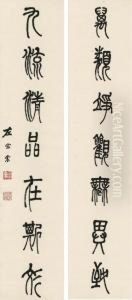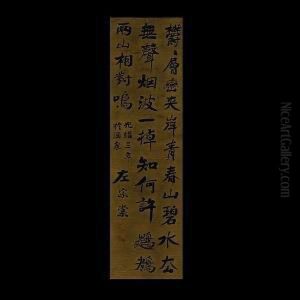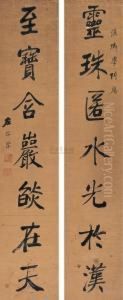Zuo Zongtang Paintings
Zuo Zongtang, also romanized as Tso Tsung-t'ang, was not an artist in the traditional sense of a painter or sculptor, but rather a Chinese statesman and military leader during the late Qing dynasty. Born on November 10, 1812, in Hunan province, Zuo was from a family with a scholarly background, though not particularly wealthy or influential. Despite failing the imperial civil service examinations multiple times, Zuo was well-educated and well-read, particularly in classical Confucian texts.
Zuo Zongtang's early career was characterized by a series of minor official positions, but his life took a dramatic turn with the outbreak of the Taiping Rebellion in 1850. This massive civil war, waged against the Qing dynasty by the Taiping Heavenly Kingdom, prompted Zuo to offer his services in support of the Qing government. He demonstrated considerable military acumen and played a crucial role in the suppression of the rebellion, eventually rising to high command.
Following the Taiping Rebellion, Zuo was instrumental in dealing with other uprisings and in the expansion and modernization of the Qing military. He is particularly noted for his campaigns in Xinjiang, where he quelled the Dungan Revolt (1862–1877). His efforts in Xinjiang led to significant territorial consolidation and the reassertion of Qing control over the region. For these accomplishments, he was appointed as Governor-General of Shaanxi and Gansu and later of Fuzhou, where he also contributed to the development of China's shipbuilding industry in an attempt to strengthen the nation's naval capabilities.
Beyond his military and administrative career, Zuo Zongtang was also involved in agricultural projects and is credited with the introduction of a variety of crops and agricultural techniques to different parts of China. He advocated for the cultivation of cash crops, such as cotton and tea, to boost local economies.
Zuo Zongtang's legacy is a complex one; he is regarded as a capable and loyal official who served the Qing dynasty during a period of immense internal strife and external threats. His efforts in stabilizing China during the 19th century were significant, and he remains a respected figure in Chinese history. Zuo passed away on September 5, 1885, and although he is not known for artistic endeavors, his impact on Chinese history is indelible.




